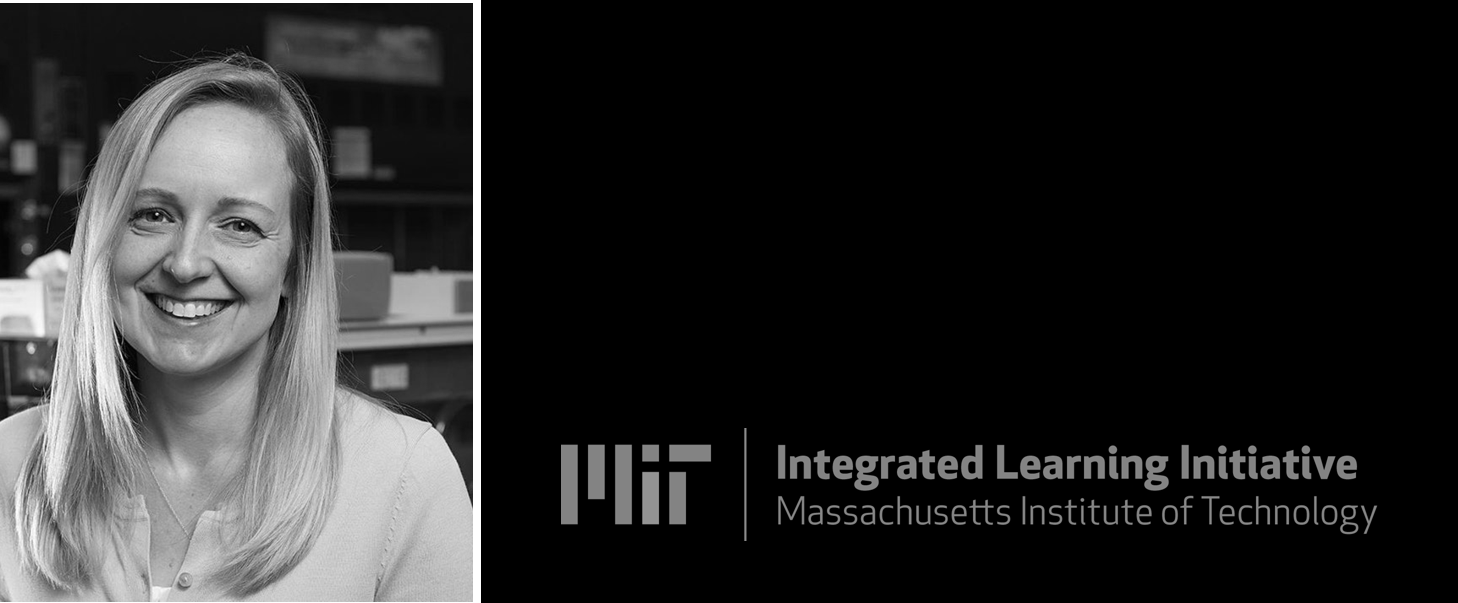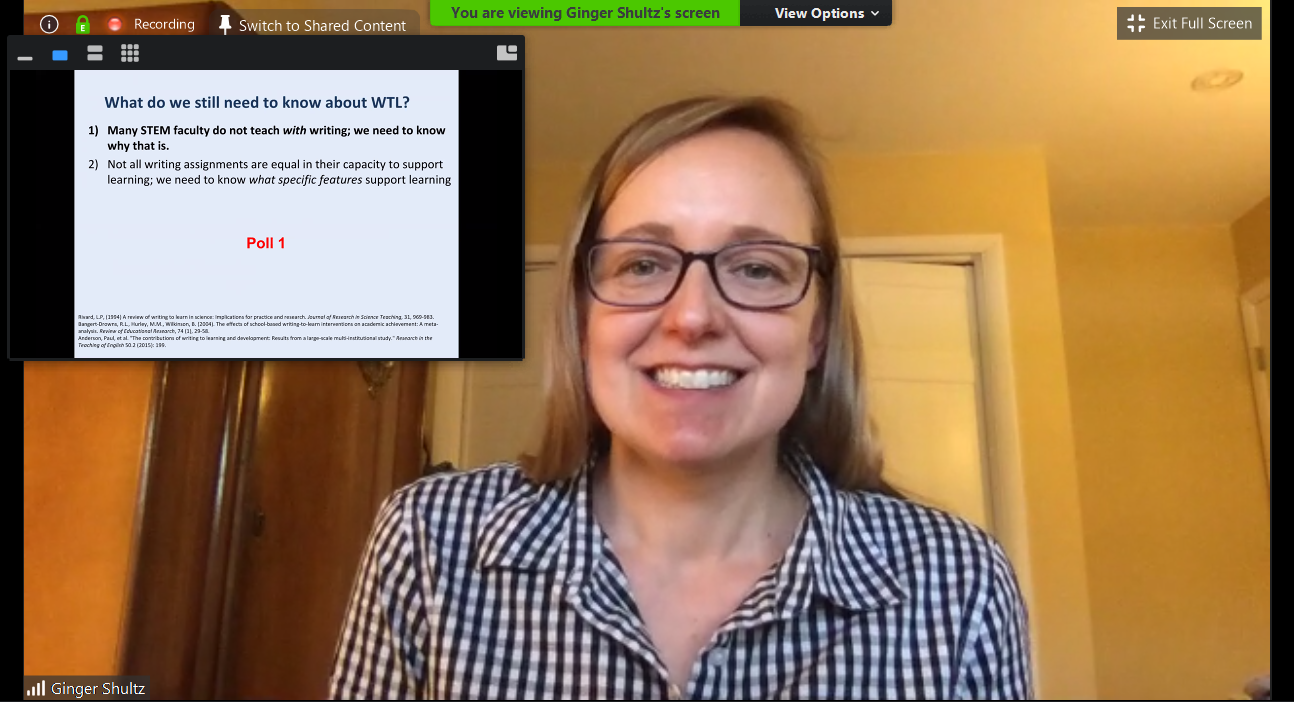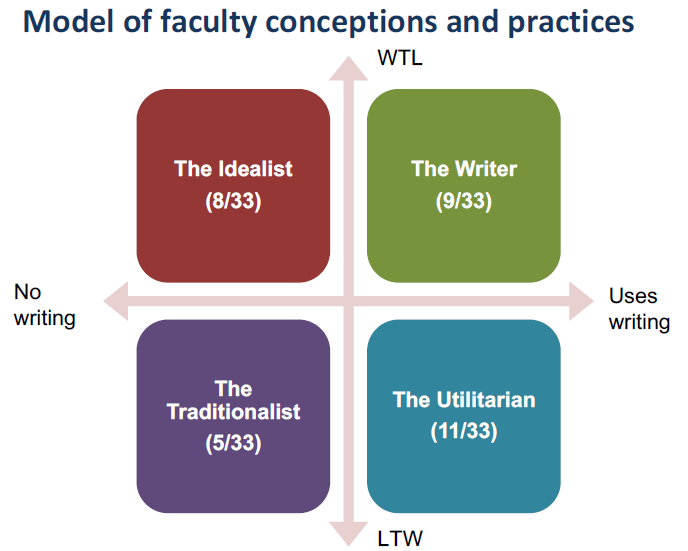
Think about the last thing you wrote? Was it an email? A blog? Maybe a grocery list? Can writing make students better learners of science?
Dr. Ginger Shultz, an Assistant Professor in the Department of Chemistry at the University of Michigan, joined the MIT Teaching and Learning Lab (TLL) for a discussion on how writing helps increase the effectiveness of science learning. Ginger completed her doctorate in polymer chemistry at the University of Oregon and transitioned to education-focused research as a in Chemistry at the University of Michigan.
Research already shows there are several advantages to ‘Writing-to-Learn’ (WTL) including improved scientific reasoning and promoted metacognition. As Shultz suggests “Writing to learn is important, not just in science but in all subjects.”
“We’re trying to understand why not all instructors use writing to learn in the classroom,” she said. While many instructors rely heavily on writing assignments, many don’t have the time to critique written assignments from several hundred students. Shultz and her team are working to find interventions that make writing-to-learn more scalable.
It can be difficult to scale quality writing feedback to large lecture halls. “Imagine trying to give quality feedback to 100 students, that might be a barrier to some instructors,” Shultz said. However, Shultz and her team have found a way to use student peer feedback via online office hours to help students with writing assignments. The program is called M-Write and was first implemented at the University of Michigan nearly eight years ago. Students must first pass a rigorous credit-based writing feedback course, and have become invaluable in helping scale written feedback in scientific education at the University of Michigan.

Shultz also explained a phenomenon known as ‘Givers Gain’, where students will often learn more from giving feedback than from receiving feedback regardless of subject matter. A student of Shultz said, “I realized reading other people’s writing, I can see the mistakes that they’ve made and I have to make sure I personally don’t make those mistakes. I also see things that they do that’s really good that I can possibly incorporate in some way or another”.
Shultz outlined four types of instructors: Traditionalist, Idealist, Utilitarian, and Writer. Traditionalist faculty see a way to use math and science to convey their scientific knowledge but tend to think that teaching students to perfect writing isn’t part of their job. Idealists, conversely, tend to think of both writing clearly and understanding the content as very important but are unable to find ways to introduce a scalable model. The Utilitarian will find it difficult to grade writing which can be subjective, so they tend to shy away from introducing too many writing assignments. Finally, Writers will challenge students with writing and provide those students with better evaluation and feedback, a prominent goal of Shultz work in using writing to make learning more effective.

“When I started teaching ten years ago, I was more of a traditionalist or utilitarian, but now I’m definitely a writer regardless of which level I’m teaching,” says Shultz, “If we’re going to put the time and effort into integrating writing into the classroom, we should make sure there are learning gains associated with writing to learn.”
One concern when writing about difficult subject matter is having students explain complex ideas to a layperson. Shultz explains that instructors will identify the audience in the writing assignment. For example, a doctor might explain a complex procedure to a newspaper reporter. In this case, the student would explain the audience in their assignment and write to that level of understanding.
Writing helps engage students in solidifying tacit and unformed ideas, it connects these ideas together, and translates them for a particular audience. This not only helps make learning more effective, but it also creates stronger ties in the classroom. If you’d like to learn more about MIT TLL or attend a future discussion, you can subscribe to their newsletter.